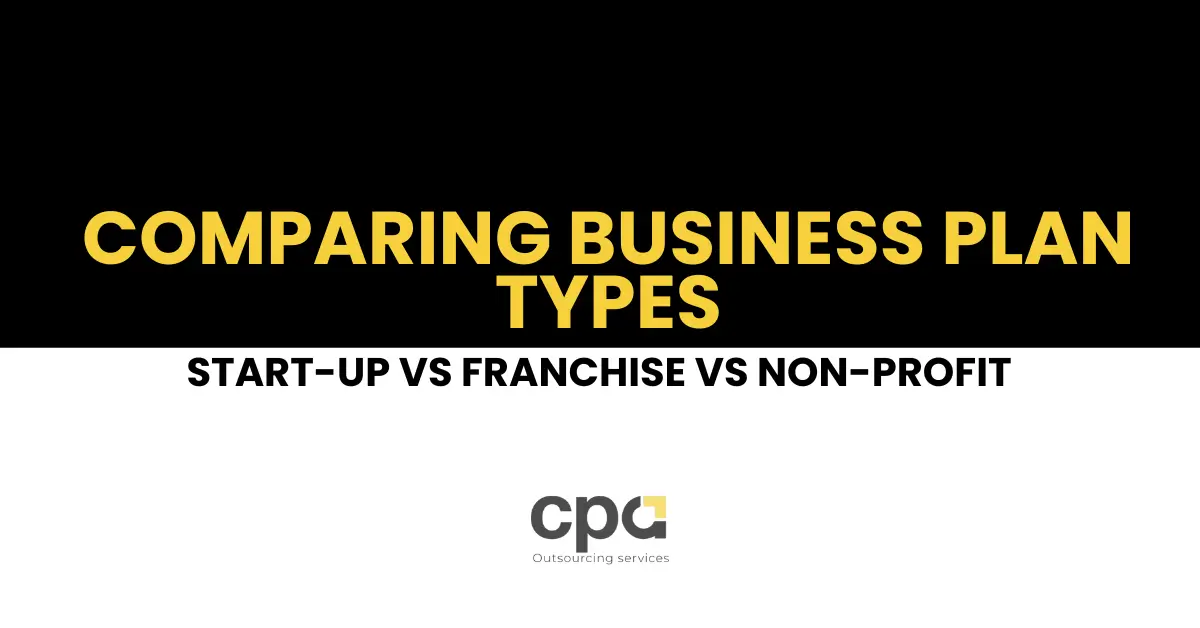Comparing Business Plan Types: Start-Up vs Franchise vs Non-Profit

Every successful organisation begins with a solid plan. But not all business plans are created equal. A tech start-up will need a very different roadmap than a non-profit community centre or a new restaurant opening under a franchise system. Understanding the various business plan types helps you choose the right structure for your goals and avoid common pitfalls.
At CPA Outsourcing Services, we’ve guided hundreds of small, medium, and large organisations across the US start-ups, franchisors, and non-profits through their planning and financial compliance. In this article, we’ll break down the main business plan types you’re likely to encounter, what makes each unique, and how to develop one that attracts funding and ensures long-term success.
Why Business Plan Types Matter?
A business plan isn’t just a document it’s a blueprint for decision-making. Investors, lenders, grant-makers, and even internal stakeholders will expect to see a plan that matches the organisation’s model and objectives. Using the wrong template or ignoring the differences can result in wasted time and lost opportunities.
For example, a start-up SaaS company would focus on market disruption and scalability, while a franchise business plan must follow strict operational guidelines and brand standards. Non-profits, on the other hand, emphasise mission alignment and impact metrics over profit margins.
The Three Major Business Plan Types
1. Start-Up Business Plans
Start-ups are about innovation, speed, and scalability. Their business plans typically include:
- Executive Summary: A high-level view of the product or service, target market, and funding needs.
- Problem and Solution: Clear explanation of the market pain point and how the start-up solves it.
- Market Analysis: Size of the opportunity, competitive landscape, and growth potential.
- Marketing and Sales Strategy: How you’ll acquire and retain customers.
- Financial Projections: Revenue forecasts, cost structure, and break-even analysis.
One of the key benefits of the start-up plan is flexibility. Investors know the model may evolve. Still, clarity is essential to win confidence and secure funding.
For instance a health-tech start-up developing an app to help patients manage chronic conditions. Their plan would detail how the technology works, the regulatory landscape, HIPAA compliance, and user acquisition strategies.
2. Franchise Business Plans
A franchise business plan differs significantly from a start-up plan because much of the concept is already proven. You’re not creating a new brand from scratch you’re buying into an established one. However, lenders and franchisors still require a clear plan that shows you can execute.
A strong franchise business plan should include:
- Background on the Franchise Brand: History, reputation, and support systems.
- Local Market Analysis: Why your chosen territory is ideal.
- Operations Plan: How you’ll meet the franchisor’s standards, including staffing, training, and supply chains.
- Financial Requirements: Initial franchise fee, equipment costs, ongoing royalties, and working capital.
- Sales Projections: Based on the franchisor’s data and your local market.
Because franchising involves strict operational guidelines, your plan must show you understand and can comply with them. This is not a place for wild innovation but for disciplined execution.
3. Non-Profit Business Plans
Non-profits may not pursue profit, but they still need sustainability. Their plans focus less on investor returns and more on mission impact:
- Mission Statement: What social problem you address and your approach.
- Programs and Services: Specific activities you’ll run and who benefits.
- Funding Strategy: Grants, donations, membership fees, or earned income.
- Impact Metrics: How you’ll measure success beyond dollars lives served, communities improved, environmental outcomes, etc.
- Governance and Compliance: Board structure, legal filings, and state/federal regulations.
Non-profit business plans should still include a budget and cash-flow projections. Funders want to know you can deliver on your promises responsibly.
Take the example of a non-profit providing STEM education to underserved youth. Their plan would show how grant money is spent, volunteer engagement, and measurable educational outcomes.
How to Choose the Right Business Plan Type
Ask yourself:
- What’s my objective? Profit, mission, or expansion?
- What’s my level of control? Am I innovating or following a franchise system?
- Who’s my audience? Investors, banks, franchisors, grant-makers?
- What metrics matter most? ROI or social impact?
Your answers will point you toward the appropriate plan format. And remember: a well-prepared plan signals professionalism and increases your odds of funding or approval.
Best Practices for Any Business Plan
Regardless of the type, some principles apply to all:
- Clarity Over Jargon: Write in plain English so stakeholders outside your field can understand.
- Credible Data: Support claims with reputable sources.
- Realistic Financials: Overly optimistic projections erode trust.
- Compliance: Ensure your plan reflects state and federal requirements.
At CPA Outsourcing Services, we provide customised support for all three business plan types. From financial modeling to compliance checks, we help ensure your plan is both compelling and accurate.
Common Mistakes to Avoid
- Copy-Paste Templates: Generic plans don’t impress investors or franchisors. Tailor your content.
- Ignoring Cash Flow: Even non-profits need healthy cash management.
- Skipping Competitive Analysis: Whether you’re a start-up or a franchise business plan, you must show awareness of competitors.
- Failing to Update the Plan: Markets change; revisit your plan regularly.
How CPA Outsourcing Services Can Help
We specialise in:
- Drafting and reviewing business plan types tailored to your model.
- Creating investor-ready financial projections.
- Ensuring compliance with state and federal regulations.
- Supporting grant applications and franchisor approvals.
Our experience with hundreds of businesses means we know what funders, investors, and franchisors want to see.
Conclusion
Choosing the right business plan isn’t just an administrative step it’s the foundation of your organisation’s future. By understanding the differences between start-up, franchise business plan, and non-profit plans, you can craft a document that speaks directly to your audience and sets you up for success.
CPA Outsourcing Services is here to help you navigate the complexities of all business plan types so you can focus on launching, growing, or sustaining your organisation with confidence.
